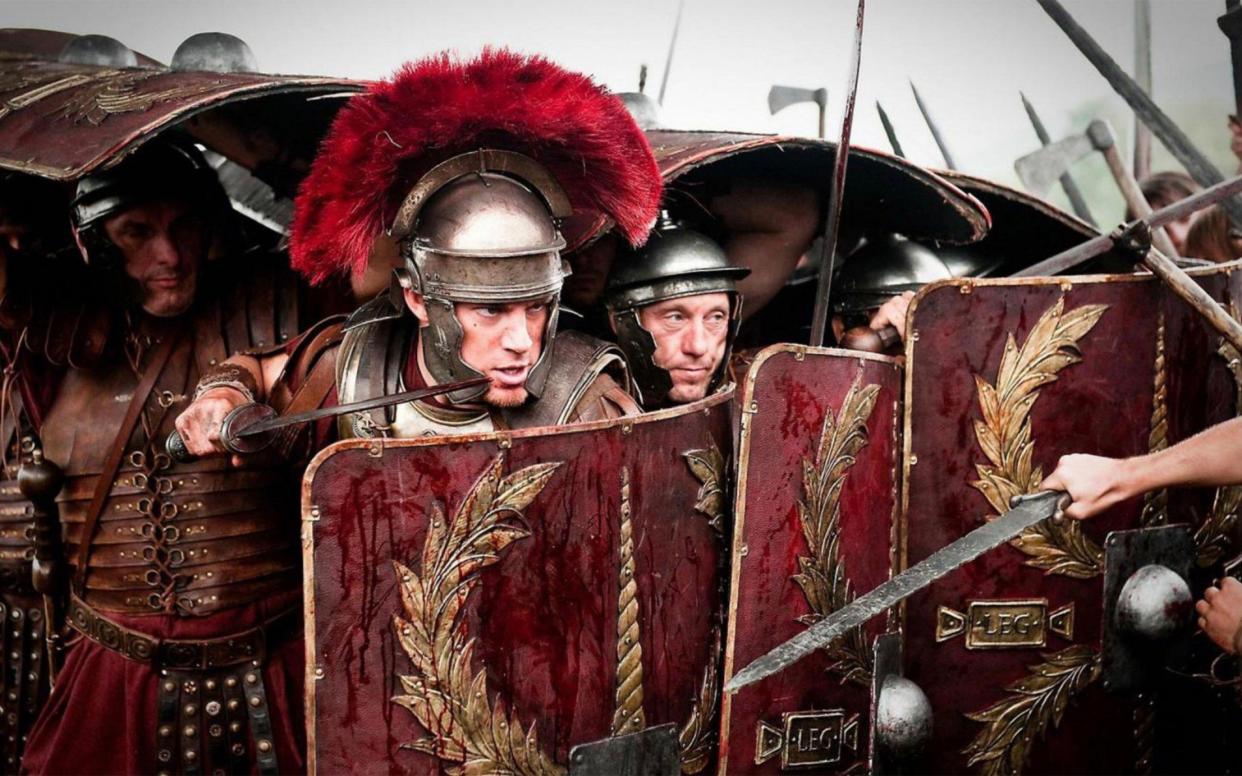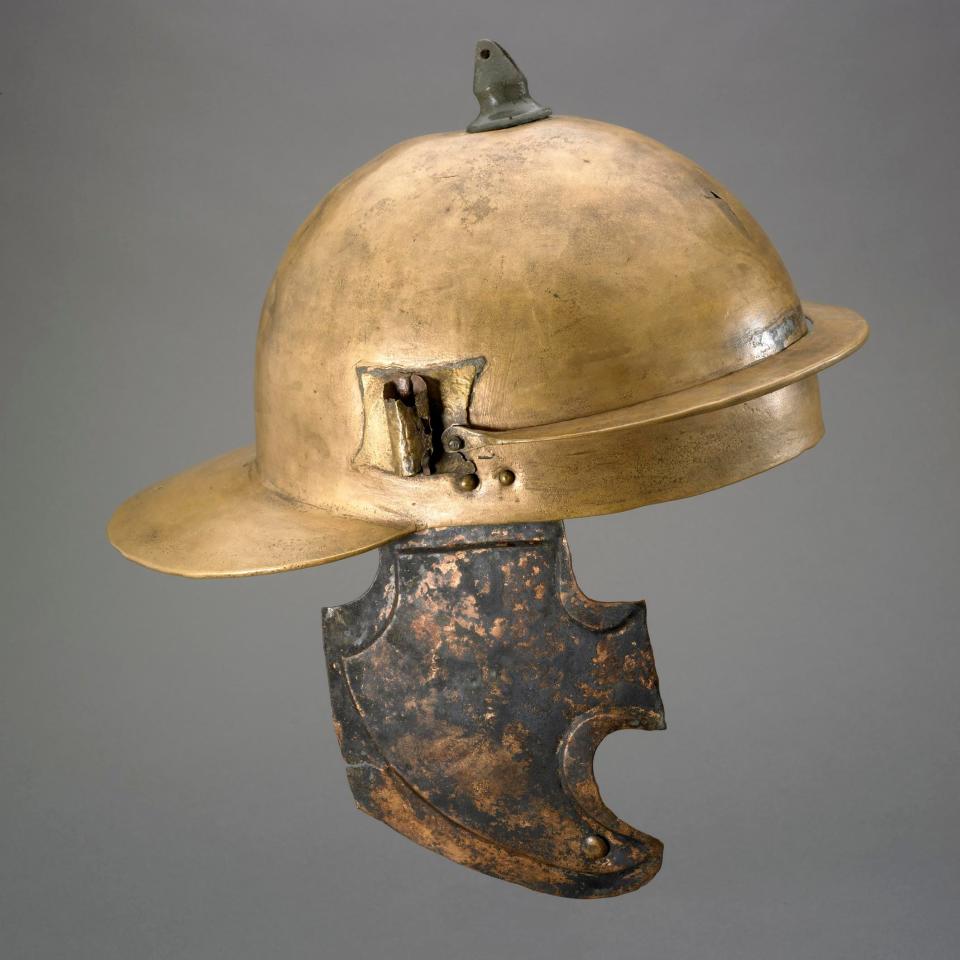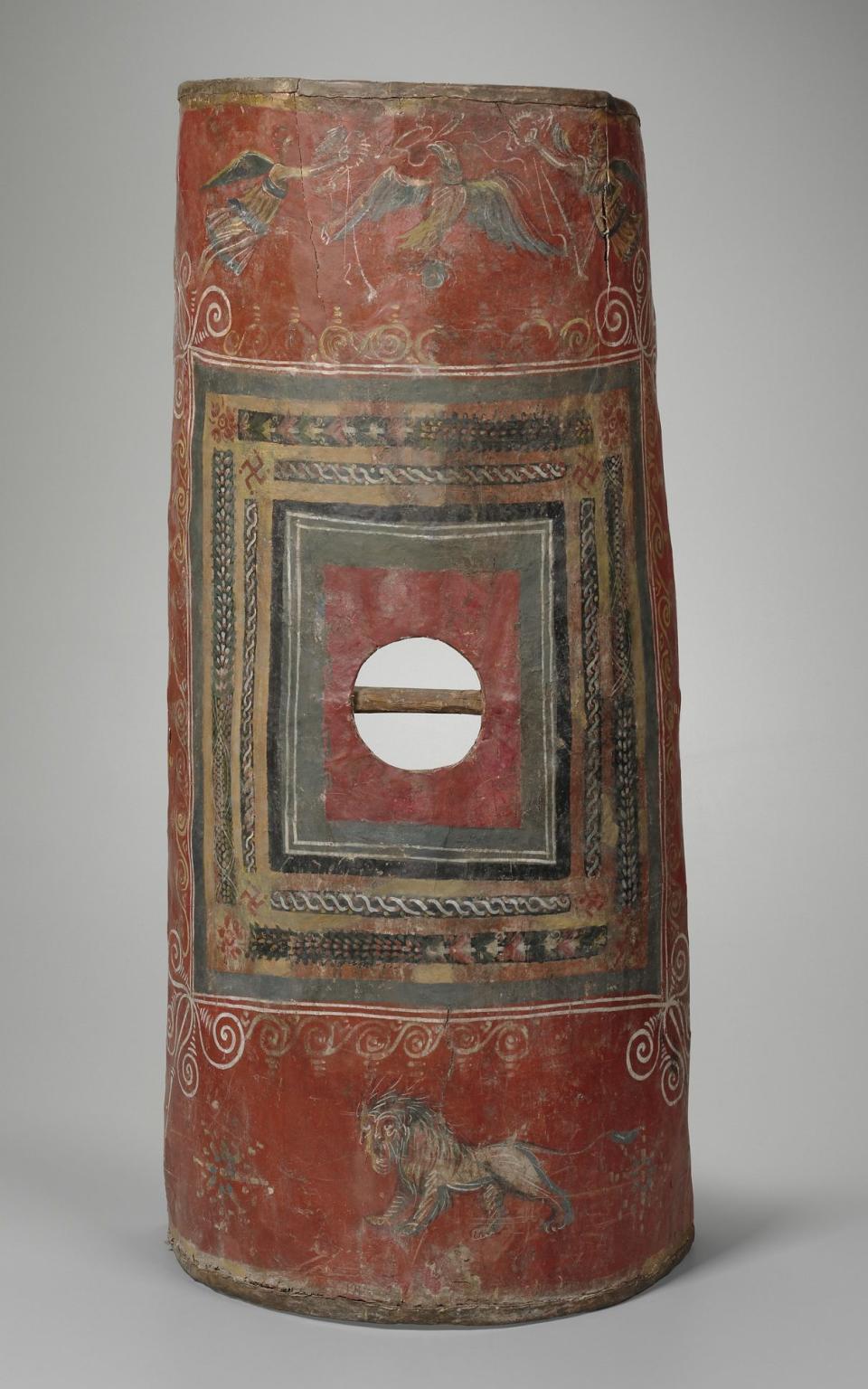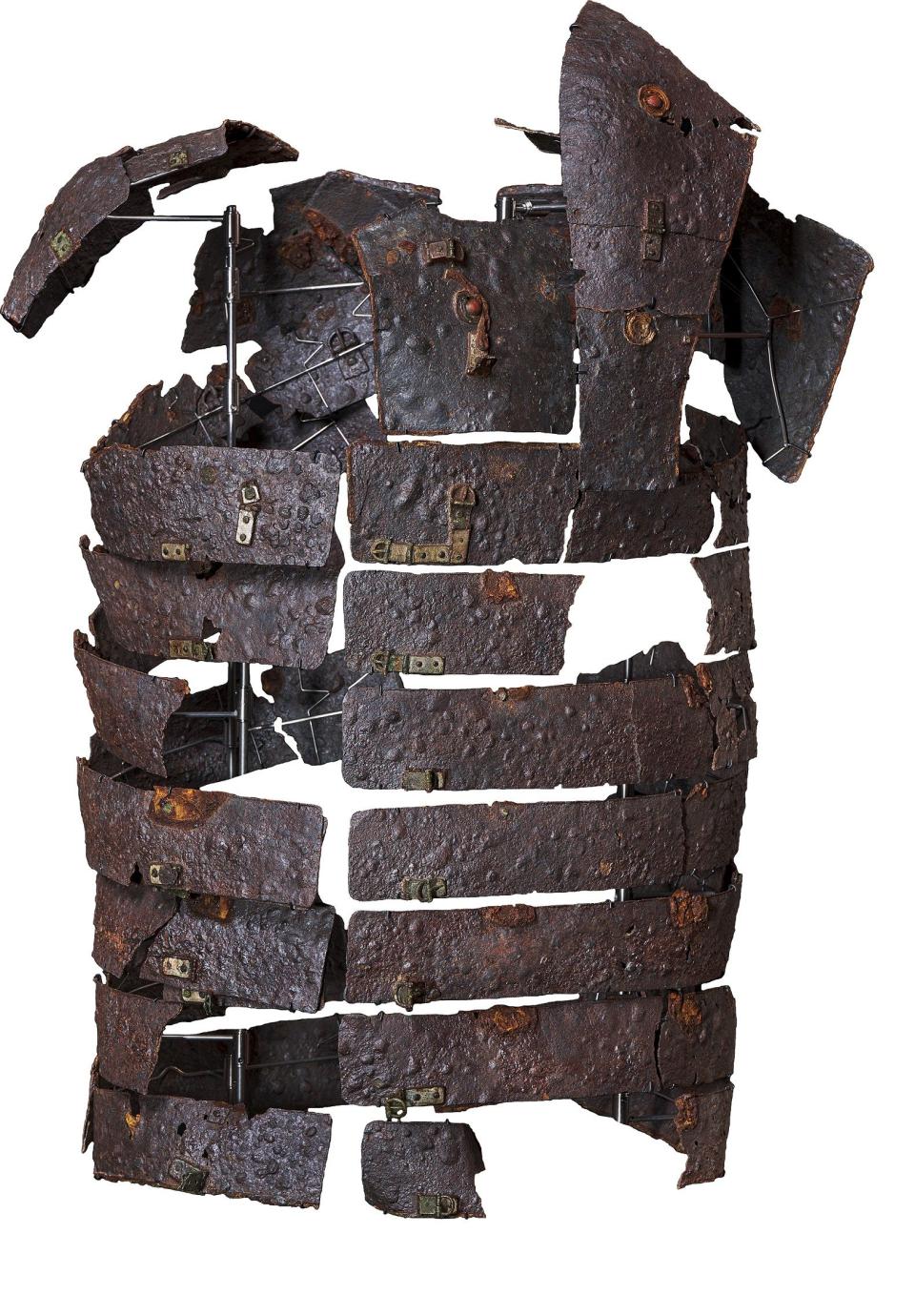Welcome to the Roman army, dear boy! What life as a legionary was really like

Legion, an exhibition opening at the British Museum next month, will explore the life of the Roman army. Skeletal remains of suspected murder victims, a war trumpet, and a legionary shield – the first to be displayed in modern Britain – will throw light on the triumphs and tragedies of that elite ancient fighting force. But what advice would a second-century AD legionary have given to a new recruit? I imagine he’d have said something like this …
You’ve joined the Roman army, I hear? I congratulate you. There is nothing quite like life in the legions. I have served with Legio XV Apollinaris for the past 10 years and, believe me, I can tell you a thing or two about how it all works.
The first point to remember is that you’re not alone. There may be just 80 men in your century (a deceptive label, I grant you), but there are six centuries in your cohort, 10 cohorts in your legion, and about 30 legions across our mighty empire. We are one big family.
You may spot the odd cavalryman among our ranks, but we are foot soldiers, for the most part. Which explains why I’ve worn out two pairs of boots this month already. If you don’t believe me, count the hobnails left in these poor leather soles. There must be parts of me scattered over the earth from Rome to the Black Sea by now.
Your postings will always be much farther away than you anticipate. Did you know that it takes nearly two months to march as far as the Rhine frontier in Germany? It’s not too bad in autumn, but try covering 20 miles a day – even more when the going gets tough – carrying enough baggage to last you three weeks. Suffice to say, if you are not a walker, you are in trouble.

I should have mentioned you must pay for your own boots. Your own linen tunic, too, which will set you back two weeks’ pay, if you’re lucky. Some advice: close your eyes and ears to the fashionistas before you buy your kit. They may laugh all they like at our “skimpy hemlines” and socks with sandals (be sure to pick up woollen socks that fit over the big toe like mittens), but since when have they ventured further than Baiae, that louche old beach resort? Trust me, by the time we reach the provinces, we are utterly en vogue.
Our armour is to die for. Sorry … unfortunate phrase. It’s handsome, though. I have always found the segmental cuirass, with its overlapping metal plates, most fetching with my helmet and cheekpieces. Admirers say I look like a silver armadillo. I love a creative compliment.
I assume you’re a tall chap. A man should be at least 5ft 6½in (169cm) to join the army these days or 5ft 8in (173cm) if he aspires to an elite regiment. The average man is a mere 5ft 2in (157cm), you say? Well, aren’t they the lucky ones!
I recommend investing in some extra bits and pieces for your comfort. You shall have a nice big rectangular wooden shield – a beautifully decorated one, even, with a strong boss – but you will not find it nearly long enough to cover your lower legs. I have one word for you, young man: greaves. Cover your legs with shinpad-like greaves whenever you need to fight, and keep some fasciae (leg-bindings) spare for added protection, especially for moving through scrubland.

You will quickly get used to the military belts, but the apron thing is a nightmare. The notion that it should in any way protect our manhood is pure bunkum. Harm, more like. Try running with metal-covered leather straps flapping at your groin.
On which point, please forgive me, but do you still have your testicles? Even one will do (after the apron this may be all we can hope for…), but the authorities do not allow eunuchs into our ranks. There is a medical to pass, so no lying; they can check.
I advise you not to become too attached to your equipment. You will probably use your iron pilum (javelin) only once and many of us lose our gladii (daggers) and tools at some point or other. My mate Terentianus had his entrenching tool stolen. He was furious. What you have left will be handed back to your legion when you die, anyway. Your family may get nothing.
My mother was nervous when I enlisted. I’d earn more money in the fields, she said, than I would in the army. Technically I guess that’s true. Become a labourer and you may find a shiny silver denarius in your pocket at the end of the day. Join a legion and you will make 300 denarii in a year.
A farm labourer isn’t at his plough 360 days a year, though, is he? The fruits of the harvest are sweet. Much of the year is fallow. Don’t knock good, steady work. Every day I thank Jupiter for our first emperor, Augustus. He made soldiering a career. No more ad hoc call-ups. We legionaries are in it for the long-run: 25 years to be precise.
We are better off than the auxiliaries. Across the empire, there are about as many of them as there are of us, and they receive just 80 per cent of our pay. Why do they put up with it? Because they’re desperate to become Roman citizens when they retire – allowing them to inherit property, and earning them the right to a trial if they ever run into trouble. As you well know, you must already be a citizen to join a legion. Respect the auxiliaries all the same. They are your helpers and will clear ground and build roads for you. Horrible, back-breaking work.
Pity the fleet-soldiers most of all. I know a lad from Egypt called Apion, who served in an auxiliary regiment in the Bay of Naples. Full of enthusiasm, he was, as he took his sign-up money and made his way to one of our chief fleets. But what glory is there in guarding a grain supply route or facing off enemies on ships? Apion will be enfranchised by the end of it, if he lives, but what a dull life.

There’s a saying among our ranks that we Romans are nothing without exercise and camp discipline. Try to keep that in mind when you’re tired of beating a post with an unrealistically heavy weapon for hours on end. Drill is tedious but must be done.
If you are injured while on campaign, fear not. We Romans have invented field hospitals, don’t you know, and are dab hands at fixing broken bones: despite their beautiful decorations, those bone-scraping steel raspatories aren’t just for show. I hear the phrase “poor hygiene” being bandied about, but I have no idea what it means.
Try to be sent somewhere good. South of the Black Sea, where I’ve served, is a bit plaguey for my liking, but Britain apparently has its plus points, regardless of what you’ve heard. Yes, the climate is dire and the people are heathens, but we have three legions there now, so you would be in good company.
I read a five-star review for a fort at Vindolanda, in the north, by Hadrian’s Wall. There’s another encompassing some five hectares in Londinium. A tip for your impecunious colleagues: if you make it to the City, where all the fat cats trade, offer your services as a witness to a contractual agreement. It’s a brave soul who refuses to cough up the money he’s agreed when a big strong soldier can come after him.

Be sure to watch your step. They’re as keen on executions in Britain as they are here. Our base at Eboracum [York] is piled high with bodies of legionaries. Poor chaps. I can’t think of a worse punishment than being thrown into an arena full of wild animals. Great entertainment, mind, if you’re safely in the bleachers.
You’ll get to know a great variety of people in the army. Just look at Trajan’s Column – that magnificent sculptural paean to our late emperor’s military prowess. Amid the many, many depictions of the great man himself, you’ll see men from North Africa among the prestigious cavalry force. The people of Africa have always been superior to us in creative stratagem. It’s worth getting to know them.
Take tips for livening up your cuisine. The food in the army can be pretty dicey – Terentianus complains of food poisoning after some dodgy fish – but you get what you pay for. And when you’re paying for food out of your own earnings, well, you don’t want to spend too much, do you? You’ll eat in the morning and again in the late afternoon. The grains and beans can be monotonous, but you’ll enjoy the pork and game. I recommend sourcing some coriander and figs to cheer up your plate. There’s always wine. True, we have to pay towards it, but the annual December festive feast is truly something to write home about. Io, Saturnalia!

The comradeship is good but times can be lonely. Only our superiors – the centurions and higher-ranking officials – are legally allowed to marry. The emperor doesn’t want to be paying out for too many military families, does he? Many of us have “wives” and children all the same. What do semantics matter? If the gods love you, you may even be able to afford your own slave-woman one day.
Make it to discharge, and your marriage may officially be recognised, and you will finally receive your bonus. You may cheer, but you will never see anyone look as happy as the auxiliary next to you as he finally gets citizenship to share with his family. One slept with his metal citizenship certificate by his bed in Pompeii. It was quite touching.
The retirement package is decent, but don’t get too excited about the pension. I shouldn’t tell you this, but most of us don’t live long enough to receive it. That’s another thing we have to pay for – our funerals. But put all that out of your mind, dear boy, and seize the day! You’re a soldier now. Fare thee well, dear friend, ave, and do bring us back a good souvenir.
Legion is at the British Museum, London WC2 (britishmuseum.org) from Feb 1-June 23. Daisy Dunn’s The Missing Thread: A New History of the Ancient World Through the Women Who Shaped It (W&N, £25) will be published on May 23


